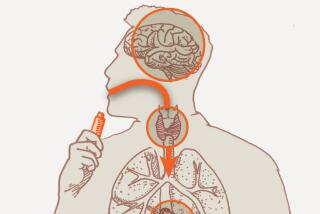Dangerous? Debate Smolders
- Share via
Some experts say boomer users are paying a physical price for long-term pot consumption. While everyone agrees that smoking harms the respiratory system, the debate over damage and addiction continues to simmer.
Dr. Michael Horwitz, director of the chemical-dependency unit at Cedars-Sinai Medical Center, says chronic users may experience mental disorders--acute panic, delirium, hallucinations, long-term memory deficiency--brain atrophy, infertility, respiratory-tract cancer and emphysema. Horwitz defines “chronic users” as people who smoke several times a week, but he says any regular use can cause some harm.
“It’s a continuum,” he says. “It’s not like you have to reach some threshold before damage is done. It’s similar to tobacco--no one would say if you smoke five cigarettes a day, it isn’t bad, but a pack is. Any cigarette causes damage . . .
“In a way, marijuana is one of the most dangerous drugs because a person can get away with using it without noticing the adverse consequences,” Horwitz says. “It’s one thing if your memory gets poor. That may not stop you from using marijuana. But if your liver is shot (from alcohol abuse) and you turn yellow, that will get your attention.”
But recent medical studies that show pot is perilous have come under fire. Mark Kleiman, an associate professor at Harvard’s John F. Kennedy School of Government, examined the field for a book aimed at guiding public-policy makers. In his 1992 work analyzing drug policy, “Against Excess,” he wrote:
“Aside from the almost self-evident proposition that smoking anything is probably bad for the lungs, the quarter century since large numbers of Americans began to use marijuana has produced remarkably little laboratory or epidemiological evidence of serious health damage done by the drug.”
At the center is the controversy over whether long-term users smoke because they want to or because they have to--and whether the imperative is physical or psychological. Horwitz argues that pot smokers who are physically addicted may not realize it because it takes several weeks for withdrawal symptoms to emerge--irritability, drug cravings, insomnia, stomach cramps and headache.
“It has a different picture of abuse and dependence than most drugs,” Horwitz says. “We say alcohol and drug addicts are in denial. Here it’s not defiant, but people are fooled into thinking it’s safer than it really is.”
Roger Roffman, an associate professor in the University of Washington’s school of social work, has been studying long-term smokers since 1986 in the only federally funded program looking at ways to help chronic users break the habit.
“Many found smoking was not compatible with parent roles,” says Roffman, 51, himself a former smoker.
“The typical client who raised that issue said, ‘I feel at this point that I don’t want to set a bad example for my son or daughter.’ Many said it had become an issue in their marriages--their spouses were saying that the person’s being high so much of the time drove a wedge between them.”
Roffman believes habitual smoking produces the physical craving to continue. But like other aspects of marijuana, the addictive pull of this hard-to-pin-down drug is also subject to debate.
“Everyone agrees that being a heavy smoker would interfere with performance,” Kleiman says. “But are people bored with everything else because they smoke a lot of marijuana or do they smoke a lot of marijuana because they’re bored?”
And even Roffman acknowledges that “marijuana dependence is not very well understood, and there haven’t been many efforts to study it nor treat it.”
Most of the volunteers in his study have been in their 30s, suggesting that some older boomers who haven’t dropped the pot habit may have learned how to handle it.
“Just as the case with alcohol, there are moderate marijuana smokers for whom the drug is not causing a lack of control, whose use is moderate and occasional,” Roffman says.






